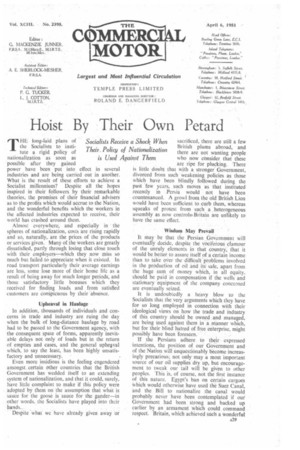Hoist By Their Own Petard
Page 31

Page 32

If you've noticed an error in this article please click here to report it so we can fix it.
THE long-laid plans of the Socialists to insti tute a rigid policy of nationalization as soon as possible after they gained power have been put into effect in several industries and are being carried out in another. What is the result of these efforts to achieve a Socialist millennium? Despite all the hopes inspired in their followers by their remarkable theories, the promises of their financial advisers as to the profits which would accrue to the Nation, and the wonderful benefits which the workers in the affected industries expected to receive, their world has crashed around them.
Almost everywhere, and especially in the spheres of nationalization, costs are rising rapidly and so, naturally, are the prices of the products or services given. Many of the workers are greatly dissatisfied, partly through losing that close touch with their employers—which they now miss so much but failed to appreciate when it existed. In road transport particularly their average earnings are less, some lose more of their home life as a result of being away for much longer periods, and those satisfactory little bonuses which they received for finding loads and from satisfied customers are conspicuous by their absence.
Upheaval in Haulage In addition, thousands of individuals and concerns in trade and industry are ruing the day when the bulk of long-distance haulage by road had to be passed to the Government agency, with the consequent spate of forms, apparently inevitable delays not only of loads but in the return of empties and cases, and the general uphepal which, to say the least, has been highly unsatis factory and unnecessary. • Even more insidious is the feeling engendered amongst certain other countries that the British Government has wedded itself to an extending system of nationalization, and that it could, surely, have little complaint to make if this policy were adopted by them on the assumption that what is sauce for the goose is sauce for the gander—in other words. the Socialists have played into their bands..
Despite what we have already given away or sacrificed, there are still a few 13ritish plums abroad, and there are not wanting people who now consider that these are ripe for plucking. There is little doubt that with a stronger Government, divorced from such weakening policies as those which have been blindly followed during the past 'few years, such moves as that instituted recently in Persia would not have been countenanced. A growl from the old British Lion would have been sufficient to curb them, whereas squeaks of protest from such a heterogeneous assembly as now controlg•Britain are unlikely to have the same effect.
Wisdom May Prevail It may be that the Persian Government will eventually decide, despite the vociferous clamour of the unruly elements in that country; that it would be better to assure itself of a certain income than to take over the difficult problems involved in the production of oil and its sale, apart from the huge sum of money which, in all equity. should be paid in compensation if the wells and stationary 'equipment of the company concerned are eventually seized.
It is undoubtedly a heavy blow to the Socialists that the very arguments which they have for so long employed in connection with their ideological views on how the trade and industry of this country should be owned and managed, are being used against them in a manner which, but for their blind hatred of free enterprise, might possibly have been 'foreseen.
If the Persians adhere to their expressed intentions, the position of our Government and of the Nation will unquestionably become increasingly precarious; not only may -a most important source of our oil supplies dry up, but encouragement to tweak our tail will be given to other peoples. This is, of course, not the first instance of this nature. Egypt's ban on certain cargoes which would otherwise have used the Suez Canal, and the Bill to nationalize the canal would probably never have been contemplated if our Government had been strong and backed up earlier by an armament which could command respect. 'Britain, which achieved such a wonderful reputation for strength, spirit and self-imposed control during-the recent war, has, in 'a few short years, and mainly as a result of the present political regime, largely lost face, not only in Europe but, what is far more important from the point of view of our imperial ' commitments, amongst the peoples of the Middle and Far East. That our sufferings, weaknesses and sacrifices have resulted from a:regrettable choice by many of our people is no consolation. It is, in fact, embarrassing to those of us who travel abroad, when we are asked why Britons, who are so courageous in war, have not the acumen, strength and initiative to throw off their shackles during peace. We are, however, not amongst those who despair of a change for the better. Our people cannot much longer accept things as they are, and there are not wanting signs that reaction is setting in. We have, as it were, been dragged through the mire, but we must shake off the mud, however tightly it clings. There must be an upsurge of spirit, confidence in the future, a freeing of the fetters imposed upon trade, whilst enterprise and leadership must be given the encouragement they deserve. It may be a hard and, for a time, thankless task, but it is one which, in the interests of the whole Nation, must be undertaken before we sink too far.




































































































